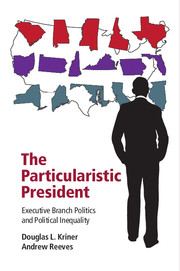Book contents
- Frontmatter
- Contents
- List of Tables
- List of Illustrations
- Acknowledgments
- 1 Introduction
- 2 The Origins of Presidential Particularism
- 3 Base Closings and Trade
- 4 Disaster Declarations and Transportation Grants
- 5 Federal Grants and Presidential Particularism
- 6 The Electoral Rewards of Presidential Particularism
- 7 Conclusion
- Appendix A Technical Appendix to Chapter 3
- Appendix B Technical Appendix to Chapter 4
- Appendix C Technical Appendix to Chapter 5
- Appendix D Technical Appendix to Chapter 6
- References
- Index
3 - Base Closings and Trade
Published online by Cambridge University Press: 05 June 2015
- Frontmatter
- Contents
- List of Tables
- List of Illustrations
- Acknowledgments
- 1 Introduction
- 2 The Origins of Presidential Particularism
- 3 Base Closings and Trade
- 4 Disaster Declarations and Transportation Grants
- 5 Federal Grants and Presidential Particularism
- 6 The Electoral Rewards of Presidential Particularism
- 7 Conclusion
- Appendix A Technical Appendix to Chapter 3
- Appendix B Technical Appendix to Chapter 4
- Appendix C Technical Appendix to Chapter 5
- Appendix D Technical Appendix to Chapter 6
- References
- Index
Summary
As an initial inquiry into the scope of presidential particularism, we examine the politics driving presidential behavior in the cases of foreign trade policy and military base closings. These policies are of national importance and affect communities directly. Decisions to grant an industry protection are an economic boon for the communities where that industry is concentrated – but they simultaneously impose an economic cost on the country as a whole. Similarly, decisions concerning military base closings involve the allocation of billions of tax dollars and can mean the difference between economic decay and rejuvenation for the affected communities.
We focus on trade and base closures for two reasons. First, in both policy areas presidents have enjoyed considerable independent authority to act without congressional approval. With respect to trade, Congress has delegated authority to the president on multiple fronts, particularly in dealing with domestic demands for protection from foreign competition. Presidents possess great discretion when deciding whether to help an industry adversely affected by free trade. As a result, when trying to understand why some industries are granted relief while others are denied, we look to the president and the incentives he faces. In the military realm, there have been significant shifts in the unilateral power of presidents to select military bases for closure over time. As a result, by comparing and contrasting the politics of base closings and where they occur across the country in times of unilateral presidential control versus when the president is constrained by statute, we can isolate the influence of presidential particularism on policy.
Second, these policies each present multiple avenues for presidents to act on their particularistic impulses. In trade policy, we see evidence of all three forms of particularism described in Chapter 2, with an emphasis on the pursuit of targeted policies to bolster the president's electoral fortunes. In the case of base closings, we find the strongest evidence for partisan particularism. Presidents seek to concentrate the economic pain of base closures in opposition party strongholds and insulate their core co-partisan constituencies from losses.
- Type
- Chapter
- Information
- The Particularistic PresidentExecutive Branch Politics and Political Inequality, pp. 50 - 81Publisher: Cambridge University PressPrint publication year: 2015

